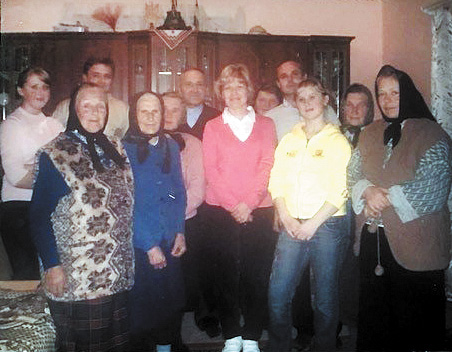
While the world is warily watching events unfolding in Ukraine, for some in the Diocese of Nashville the anxiety is heightened.
Olesia O’Bryan and Helena Hess are worried about relatives still in Ukraine. And Anthony Martinez, a U.S. Army soldier stationed at Fort Campbell who is going through RCIA, is watching to see if his unit will be deployed to Europe.
O’Bryan, a parishioner at St. Philip Church in Franklin, has been trying to put aside her worries about her family so that she can work. “It’s hard because it’s distracting,” she said.
A native of Ukraine, she moved to the United States about eight years ago to work for a health care software developer. Her parents and two sisters and their families are still living in the city of Chernivtsi in western Ukraine near the border with Romania.
So far, the fighting near there has been light, O’Bryan said. “Fortunately, there’s still internet and power,” so she can continue to communicate with them.
However, one brother-in-law, a veteran of the Ukrainian army who joined the resistance as a volunteer after Russian troops invaded the country, is in Kyiv, the country’s capital. “He’s OK now, but he said it’s getting bad there,” O’Bryan said.
Her sisters, who have young children, are trying to get out of Ukraine, O’Bryan said.
“The borders are crazy now,” O’Bryan said.
Her parents visited O’Bryan over the Christmas holidays to see their granddaughter Olivia, who is 11 months old, for the first time.
“They’re fine for now,” O’Bryan said of her parents. “Unfortunately, my dad had surgery a week before the invasion, so now they can’t leave the country.”
He was discharged from the hospital early because the space is needed for wounded soldiers, O’Bryan said.
As Russian troops were massing on the border in recent months, people in Ukraine were divided about what it meant, O’Bryan said. Some thought it was just a scare tactic, she said. “But some were really believing it was going to happen. I would say most of the people were still hoping it was not going to happen.”
Before the invasion, there were people in Ukraine who wanted their country to have closer, friendlier relations with Russia. “Now, everyone hates them.”
Despite the cultural ties between the two countries, the people of Ukraine don’t want to be part of Russia, said Hess, a parishioner at Holy Family Church in Brentwood. “They see themselves as Ukrainians,” she said. “They want independence.”
Hess’ parents immigrated to the United States from Ukraine in the 1950s and she still has relatives living in the city of Ivano-Frankivsk in western Ukraine near the border with Poland. “I handle stress pretty well,” Hess said, “but I think psychologically it’s affecting me because I’m worrying about them.”
She has been texting her relatives, “just trying to keep up with them,” Hess said. One of her nieces texted her that with everything going on, she hoped she would be able to see Hess again, “which made me really sad.”
A cousin texted that the city’s airport was being bombed. “I thought, ‘Oh gosh, that’s pretty close,’” Hess said.
“I’m trying to absorb all this,” she said. “It just seems unbelievable.”
Hess also has relatives in Poland, who have been offering to help their Ukrainian relatives leave the country. “I don’t think they want to leave,” she said.
A special education teacher for Metro Nashville Public Schools, Hess asked her students to close their eyes and imagine a place. “I went to Ukraine,” Hess said. “I was remembering all the good things. It was peaceful. I thought it’s such a beautiful place. I hope they don’t destroy it.”
At Immaculate Conception Church in Clarksville, where a significant portion of the parishioners have a connection to the Army and Fort Campbell, the situation in Ukraine has been in the front of minds, said Father Jacob Dio, MSFS, the pastor.
Parishioners are asking him to pray for peace and for relatives who have been deployed to support NATO troops in the region, Father Dio said. “People are expressing some concerns,” he said.
Typically, the RCIA program would culminate with the catechumens and candidates receiving the Sacraments of Initiation at the Easter Vigil. But Father Dio celebrated the sacraments of Baptism, Confirmation and the Eucharist for Martinez on Sunday, Feb. 27, because he was concerned he might be deployed before Easter, Father Dio said.
Several hundred soldiers from the 101st Airborne Division at Fort Campbell have already been deployed to Europe to support NATO, and the rest of the division is preparing in case they are deployed as well, Martinez explained.
He asked to move up his sacraments so he would be “set and ready to go as far as my Catholic faith,” Martinez said.









